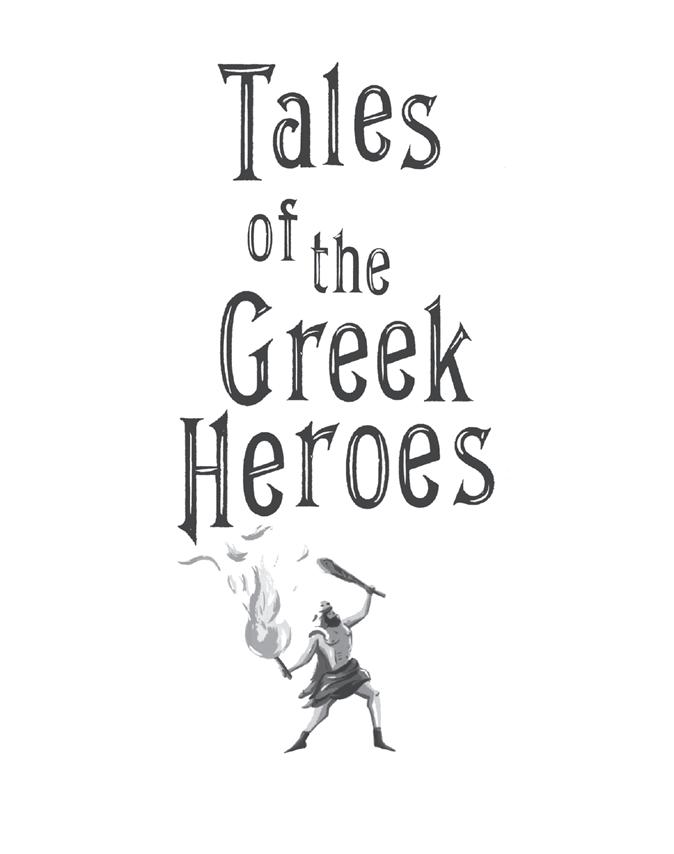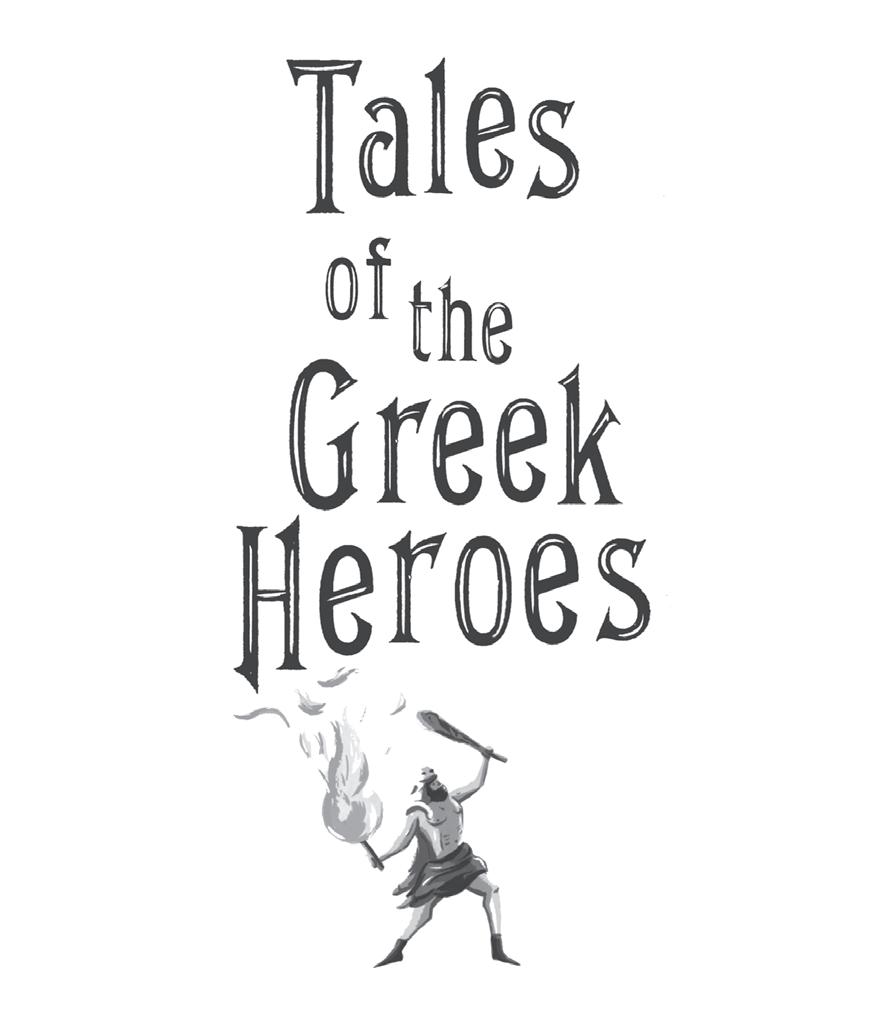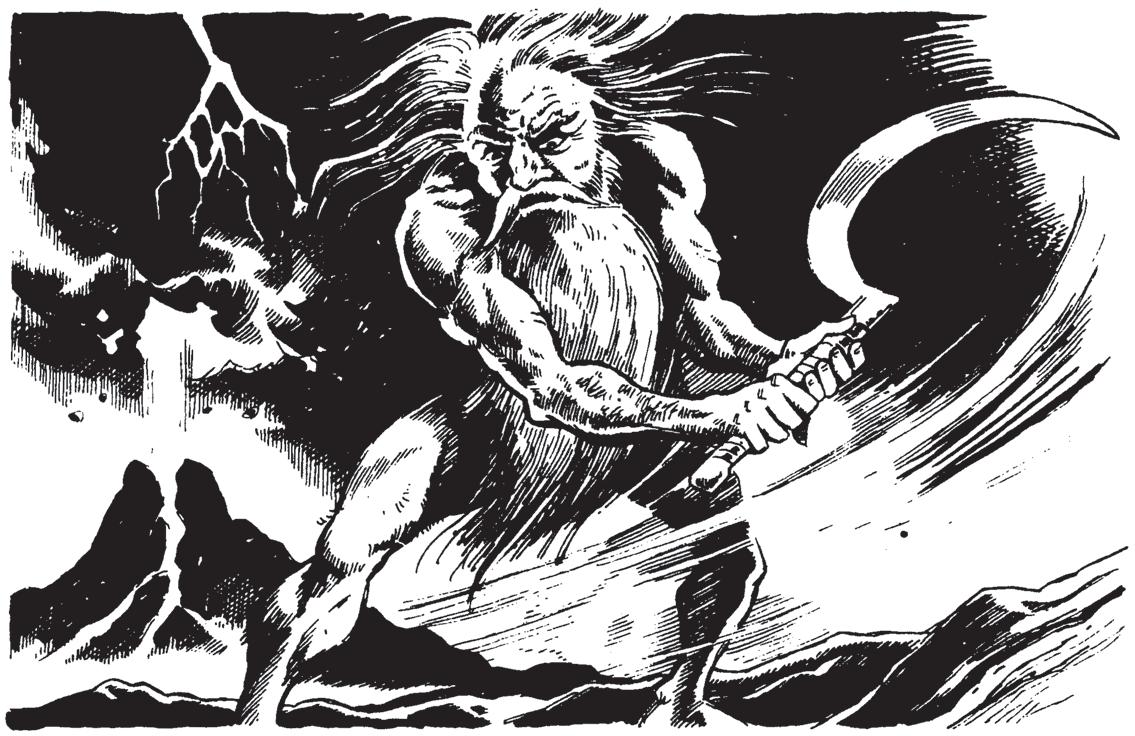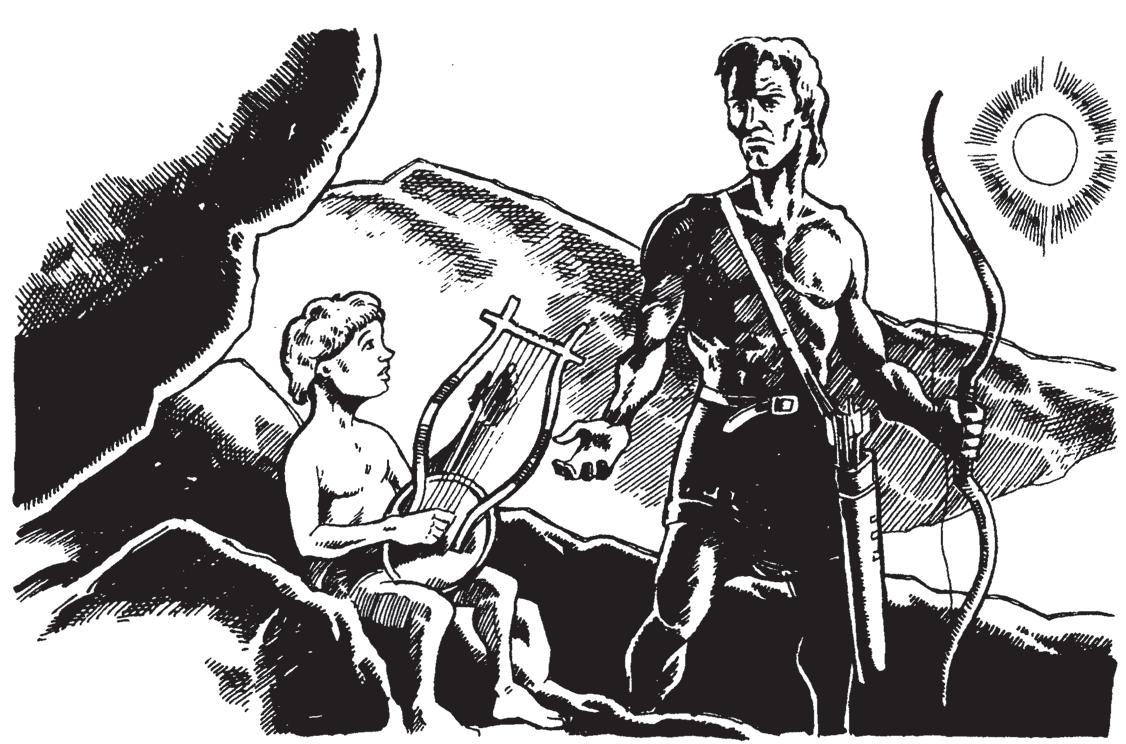ROGER LANCELYN GREEN




In the house of Epimetheus stood a golden box which Prometheus had left there with strict orders that no one was to open it. Epimetheus told his wife this, but she was so curious and inquisitive that life did not seem worth living until she knew what treasure it was that her husband was hiding from her.
So one day when he was out, Pandora crept quietly to the golden casket and lifted the lid. Then with a rush and a cry out came all the ills which beset mankind –diseases, and sorrows, hate, jealousy, lies, theft, cheating, and a hundred others.

INTRODUCED BY RICK RIORDAN
Illustrations by A LAN L ANGFORD Illustrations by A LAN L ANGFORD
UK | USA | Canada | Ireland | Australia India | New Zealand | South Africa
Puffin Books is part of the Penguin Random House group of companies whose addresses can be found at global.penguinrandomhouse.com.
www.penguin.co.uk www.puffin.co.uk www.ladybird.co.uk
First published 1958
First published in Puffin Books 1994 Reissued 2015
This edition published 2025
Text copyright © Roger Lancelyn Green, 1958 Illustrations copyright © Alan Langford, 1994 Introduction copyright © Rick Riordan, 2009 Endnotes copyright © Penguin Books, 2009
Penguin Random House values and supports copyright. Copyright fuels creativity, encourages diverse voices, promotes freedom of expression and supports a vibrant culture. Thank you for purchasing an authorized edition of this book and for respecting intellectual property laws by not reproducing, scanning or distributing any part of it by any means without permission. You are supporting authors and enabling Penguin Random House to continue to publish books for everyone. No part of this book may be used or reproduced in any manner for the purpose of training artificial intelligence technologies or systems. In accordance with Article 4(3) of the DSM Directive 2019/790, Penguin Random House expressly reserves this work from the text and data mining exception.
Set in Minion by Palimpsest Book Production Limited, Falkirk, Stirlingshire Printed and bound in Great Britain by Clays Ltd, Elcograf S.p.A.
The authorized representative in the EEA is Penguin Random House Ireland, Morrison Chambers, 32 Nassau Street, Dublin d02 yh68
A CIP catalogue record for this book is available from the British Library
isbn: 978–0–241–73612–8
All correspondence to: Puffin Books
Penguin Random House Children’s One Embassy Gardens, 8 Viaduct Gardens, London sw11 7bw
Penguin Random Hous e is committed to a sustainable future for our business, our readers and our planet. is book is made from Forest Stewardship Council® certified paper.
Before Luke Skywalker, before Batman, before even King Arthur, there were the Greek heroes. Those guys knew how to Wght!
Imagine being trapped in a dark maze with no weapons, facing a three-metre-tall mutant with the head of a bull. Imagine being forced to do twelve jobs for your worst enemy: little things like stealing the Lord of the Dead’s guard dog, slaying an eight-headed hydra or cleaning 12 billion kilos of manure out of a stable. Imagine facing an enemy like Medusa, who could turn you to stone with a single glance.
When I was a kid, I wanted to be a Greek hero. I wished I could face their challenges. Well, okay, maybe not the stable-cleaning task, but everything else sounded pretty cool. I wanted to borrow Perseus’s sword, mirrored shield and winged shoes. I wanted to sail on the Argo with Jason to Wnd the Golden Fleece. I wanted to be as strong as Hercules and pulverize giants with my bare Wsts.
This book, by Roger Lancelyn Green, was one of my
W rst introductions to the amazing world of Greek mythology. If it weren’t for this book, I probably never would have written my own books about a modern-day demigod, Percy Jackson. If you like fantasy, comics, action and adventure movies, horror or any other type of story with heroes and monsters, you will love Tales of the Greek Heroes, because Greek mythology is where it all started. In this collection you will face Wre-breathing bulls and many-headed dragons. You will meet clever sorceresses, treacherous centaurs, jealous gods and evil kings. You will sail into unknown waters, soar up to Mount Olympus and descend into Hades. Not every story will have a happy ending, because a hero’s journey is never easy and often fatal, but along the way you will meet many loyal friends and courageous allies.
Ready to get started? Fasten your armour. Grab your shield. Make sure your sword is sharpened. Within these pages are monsters that have been waiting 3,000 years to Wght you. It’s time you showed them who’s boss.
Dedicated to the memory of Emily and Gordon Bottomley
Once we fared with the Argo, sailing
The ancient seas for the Fleece of Gold, The distant gleam and the song prevailing Over the dragon guards of old;
And we have wandered the Islands ringing With the Aegean thunder still, Plucked the unfaded blossoms springing Yet for us on the Muses’ hill
After Euripides Hypsipyle
19 The Battle of the Giants
Author’s Note
The Gods and Goddesses of Ancient Greece
Map, showing the Route of the Argonauts (drawn by Sheila Waters) 274–5
chapter one
What forms are these coming So white through the gloom? What garments out-glistening The gold-Xower’d broom?
First hymn they the Father Of all things; and then The rest of Immortals, The action of Men.
matthew
arnold Empedocles on Etna

If ever you are lucky enough to visit the beautiful land of Greece you will Wnd a country haunted by more than three thousand years of history and legend.
The towering mountains slope steeply into the bluest of blue seas, and between the mountains lie valleys green and silver with the leaves of a million olive trees; golden with corn in the early summer, and then brown and white as the hot sun dries all up until the wide rivers become tinkling streams wandering in great courses of grey and yellow stones.
In winter and early spring the mountains are clothed
with snow; mist hides the higher lands, and the rivers are roaring torrents racing down into the great gulfs and bays which break up Greece into little divisions as surely as the mighty mountains do.
As you wander through Greece in the late spring you are back in those ancient days the moment you leave the towns behind. Up on the green slopes below the towering heights of the great mountains, of Parnassus or Taygetus or Cithaeron, you can sit and dream yourself back into the time when you might expect to meet an Immortal on the mountain, in the olive-groves, or in the lonely valleys.
Far away a shepherd pipes to his Xock, magic notes stealing up through the warm silence: surely that is Pan, half-goat, half-human, who guarded the shepherds of old? Among the olive leaves stand the broken columns of temples, grey, or white, or golden-yellow: every one has a tale to tell – a legend, a story, or an actual history.
Over the blue sea, with its streaks like purple wine, lie islands dotted away into the distance: and they too have each a tale to tell. It may be Delos, perhaps: no one lives on it now, but the ruins of cities and temples, harbours and theatres, cluster from the shore to the hilltop on which Apollo the Shining One and his sister Artemis the Maiden Huntress were born. Or it may be rocky, rugged Ithaca, from which Odysseus sailed to the siege of Troy, and found again after ten years’ wandering over strange and dragonhaunted seas.
With all the breath-taking beauty of Greece round about them, it is hardly wonderful that the ancient Greeks felt that the mountains and the valleys, the woods and streams, the very sea itself, were peopled with Immortals. There were wood-nymphs among the trees and waternymphs in the rivers – fairies of human size who did not die and had powers which mortals do not possess. There were sea-nymphs too – mermaids, though not all of them had tails – and strange sea-beings, who might be cruel and Werce even as the sea was Werce and cruel when the storms arose. And the sea must have a King, more powerful even than the nymphs, the Immortal called Poseidon who might come up through the waters in his chariot drawn by white horses, waving his trident – the three-pronged spear which was his sceptre, or sign of power.
On land also there were Immortal powers. Apollo, shining like the sun, who was also the lord of music and poetry; Artemis the Huntress who guarded all wild things; Werce Ares the warlord, whose terrible shout might ring across the Weld of battle when the spears were Xying and the swords of bronze or iron clanged on the shields and helmets; Athena, Immortal Lady of wisdom; the kind Mother Goddess, Demeter, who caused the corn to grow and the young lambs to be born, with her lovely daughter Persephone who had to spend half the year in the kingdom of the dead when dark winter was spread over the earth.
Then there was Aphrodite, Immortal Lady of Beauty and Love, with Eros her son who shot the invisible arrows that made a young man or girl fall in love; there was Hephaestus, more skilled than any mortal man in working with bronze and gold and iron, whose forge was beneath the island of Lemnos, with a volcano as his furnacechimney; there was Hermes of the winged heels, swift messenger, more cunning than any human; there was Dionysus who gave such power to the grapes that they could be brewed into wine to be a joy and a comfort to mankind; and there was the quiet Hestia, Lady of the home and guardian of the hearth – for the hearth was the heart of the home in the days when Wre was diYcult to make.
All these, and more, were the Immortals, and their powers were great. But they too must surely obey laws and have a ruler set over them – and this was Zeus, the King of Heaven and of Earth, who wielded the thunderbolt, and was father of Mortals and of Immortals; and his Queen was Hera, Lady of Marriage and guardian of children. Zeus had power over all Immortals, though he seldom exercised it over his brothers, Poseidon, Lord of the Sea, and Hades, Lord of the Dead, whose kingdom of shadows was thought to be beneath the earth.
The Greeks called these Immortals the ‘Gods’, and worshipped them, making sacriWces to them at their
particular shrines: Zeus at Olympia, Apollo at Delphi, Athena at Athens, and so on. When they began to tell the stories about them they had very little idea of what gods should be, and quite naturally pictured them as very like themselves, but much more powerful, more beautiful, and more free. Nor did it seem wrong to them to imagine that gods and goddesses could be cruel, or mean, deceitful, selWsh, jealous, or even wicked, according to our ideas, and as they themselves would have thought if ordinary men and women had done as the gods did.
Another trouble was that the Greeks in each of the little kingdoms and cities, and in the islands, made up diVerent stories more or less without knowing what was being told over the sea, or beyond the mountains. Then, later, when minstrels travelled from place to place, and writing became more common, and people began to meet those from other parts of the Greek world, they found that many of the stories did not agree.
‘Hera is the wife of Zeus,’ the people of Argolis would say. ‘Nonsense!’ the Arcadians would answer. ‘He married Maia, and they had a son called Hermes!’ ‘What are you talking about?’ the people of Delphi or Delos would protest: ‘The wife of Zeus is called Leto, and they had two children called Apollo and Artemis!’
Well, there was only one thing for it: they had to agree that Zeus must have had several wives! But Hera, as the most important of the Immortals, was obviously the real
Queen of Heaven – and, as a woman would be, she was jealous!
In the earliest days the Greeks themselves often had several wives, as the people of Egypt did, and as the Turks and the Indians did until quite recently. In Greece, however, there was usually one real wife, and the others were captives taken in war, who were treated more and more as mere slaves; well looked after, but obliged to do just as they were told.
So it was not diYcult to think of Zeus or Apollo behaving in much the same way as such a King of Athens as Theseus: and of course, over in Asia, kings always had many wives. That was where Troy was, so naturally King Priam had Wfty sons, and Hecuba, the Queen of Troy, was simply his chief wife.
Each of the little Greek kingdoms, or city-states, had its own Royal Family; and each Royal Family liked to trace its descent back to one of the gods. It was much the same in England a thousand years ago: Alfred the Great was said to be descended from Odin, who held just the same place among the Saxons and the Danes as Zeus did among the Greeks. Indeed, if we believe the old writers of the Middle Ages, our own Royal Family, right down to the present Queen herself, can trace its descent from Odin on the one hand, and from Antenor who was the cousin of Priam of Troy, on the other!
Certainly Hera had some reason to be jealous – and she
was very jealous indeed, or so the stories tell us – of Zeus’s mortal wives: and he had one in nearly every kingdom, just as sailors were said to have a wife in every port!
When the Greeks began to tell stories of the gods and goddesses, they had not become very civilized, so the legends seemed quite normal and credible to them. But as time went on, and the Greeks thought and learned more and more, some at least of them began to wonder about many of the stories: they began to realize that there was only one real God, and that he was good – better than any man could be.
Surely, however, this God must be Zeus: therefore Zeus himself must have become better and better, and have learnt by suVering until he understood what Mercy really meant.
Then the story-tellers realized that this Wtted in rather well with the oldest of the stories about the gods. For in the very early days, before Zeus came, there were other gods – terrible creatures who were hardly people at all –who were as cruel and as dreadful as a tempest or an earthquake, as a tidal wave or an erupting volcano. These, in the earliest stories of all, those made by savage ancestors ages before, were the children of the Sky and the Earth. They were Giants and Titans, terrible ogres and trolls with many hands, or snake-like tails; and the most terrible of them was called Cronos – and he was the father
of the real gods, of Zeus, Poseidon, Hades, and of the goddesses Hera, Hestia, and Demeter.
We need not try to imagine what Cronos was like. The Greeks who invented the stories about him cannot have done so. His name means Time – but it was only the Romans who began to picture him as kindly old Father Time, with his scythe and his hourglass.
The original Cronos was horribly diVerent. He had a scythe, indeed, or rather a sickle – but he used it to cut pieces oV his father Uranus, or Sky!
‘You may be our ruler now!’ Sky told him. ‘But your children will treat you just as you have treated us and worse. They will bind you in a terrible prison, and one of them will rule instead of you!’ And what Sky said, Earth said also, and Cronos knew that Earth cannot tell lies.
‘We’ll see about that!’ roared Cronos, and he began to swallow his children as soon as they were born – just as Time swallows up the years, one after another.
First he swallowed Hestia, and then Demeter and Hera, and after them Hades and Poseidon.
This was too much for his wife, Rhea, although she was much the same kind of creature as Cronos; and as soon as her youngest son, Zeus, was born, she hid him away in a cave on the island of Crete.
‘Where is the child?’ demanded savage Cronos, and Rhea gave him a great stone wrapped in baby-clothes – and he swallowed that, thinking it was Zeus.
But Zeus was safe enough in Crete, guarded by the mountain-nymphs, the children of kindly Mother Earth.
When he was fully grown, Zeus sought counsel of the good Titaness Metis, or Thought, who gave him a magic herb which he put into Cronos’s wine. It made Cronos very sick, and up came the swallowed children, still very much alive, and all very angry.
The stone came up too, and you may see it to this very day just where it fell, at Delphi. Beside it is another stone which Zeus placed there to mark the centre of the earth: for he let loose two eagles, one from either end of the world, and they met exactly over Delphi.
Then for ten years Zeus, with his brothers and sisters, fought against Cronos and the Titans, and at last beat them, with the aid of the Cyclopes. These were giants with only one eye each, which was in the middle of the forehead. They made thunderbolts which Zeus showered down on his foes; and they made the trident with which Poseidon stirred up the sea to drown his enemies; and they made a helmet of invisibility for Hades, who, when he wore it, could creep up unseen behind the Titans.
When the war was ended, Zeus shut up Cronos and the Titans in a Wery prison under the earth called Tartarus; and in after days the souls of the wicked were sent there to suVer with them.
Zeus and his brothers then cast lots to see which should rule the air, which the sea, and which under the earth:
and so Zeus became the King of Heaven, Poseidon ruled the waves, and Hades the realm of the dead.
Then there was peace, and Zeus caused the palaces of the gods to be built: but whether their golden home was on Mount Olympus in the north of Greece, or on some cloud-mountain high up in the heavens, the Greeks were not quite certain.
After this Zeus began to restore the bruised and battered earth, for the Titans had thrown great mountains about, and brought desolation wherever they went.
Not all the Titans had taken part in the war, for the stories say that Helios, who drove the chariot of the Sun, was a Titan, and so was Selene, the Moon, and so too was Ocean, the very sea itself. And there were Metis, or Thought, Themis, or Justice, and Mnemosyne, or Memory, the mother of the Nine Muses, who lived on Mount Helicon. The Muses, of course, attended to the Arts –History, Lyric Poetry, Comedy, Tragedy, Dancing, LovePoetry, Hymns, Epic, and Astronomy; and they were the special companions of Apollo.
One of the Titans who were imprisoned in Tartarus was Iapetus. He had three sons, two of whom helped Zeus in many ways. The third son, the only one who looked like a Titan, was Atlas; who fought against Zeus, and for a punishment was made to stand on top of Mount Atlas in North Africa and hold up the sky on his shoulders.
The two helpful sons of Iapetus were Prometheus and Epimetheus; and the Wrst of these was one of the most important Wgures in all Greek myth.
chapter two
There through the dews beside me Behold a youth that trod, With feathered cap on forehead, And poised a golden rod.
With lips that brim with laughter But never once respond, And feet that Xy on feathers, And serpent-circled wand.
a . e . housman
The Merry Guide

Before the great war with the Titans there had been men on the earth, and that time was the Golden Age when the corn grew without ploughing or sowing, and all the animals lived on fruit or grass.
The Golden Age came and passed, for no children were born, and the men and women did nothing but eat and drink, and wander about the lovely garden of the world.
Then came the men of the Silver Age, and with them came wickedness and evil, because of Cronos and the Titans; and they were destroyed utterly from the earth
and were imprisoned with their wicked makers in Tartarus.
But when Zeus sat throned in Olympus, and the great war was over, he called to him the good Titan Prometheus.
‘Go,’ he said, ‘and make Man out of clay. Make him in shape and form like the Immortals, and I will breathe life into him. Then you shall teach him such things as he needs to know, so that he may honour the Immortals and build temples for us. And after a little time he shall die and go down to the realm of my brother Hades, and be subject to him.’
Prometheus did as he was told. He went to a place in Greece called Panopeus, not many miles to the north-east of Delphi, and from the red clay he fashioned Man. Then Zeus gave life to the clay men, and left Prometheus to teach them all things needful.
‘You may give such gifts as are suitable,’ Zeus said, ‘but you must not give them Wre – for that belongs to the Immortals. If you disobey me in this matter, your fate shall be more terrible than that of all the other Titans put together!’
After this Zeus went away into the rocky land of Arcadia in the south of Greece and dwelt there for a while with the Star Maiden Maia. They lived in a cave on the beautiful Mount Cyllene, and there a marvellous child was born, whose name was Hermes.
None of the Immortals knew where Zeus had gone,
nor what he was up to: but Apollo learnt, and in a strange way.
Apollo owned a herd of the most magniWcent cattle, and they were guarded for him by Helios, the Titan who drove the chariot of the Sun, and who could see all that happened on the earth during the day.
One morning he sent a message to Apollo: the cows had vanished! Last night they were grazing peacefully in a green valley of Arcadia, and today there was not a trace of them to be seen.
Full of rage, Apollo set out across Greece in search of them, uttering terrible threats against the thief, and promising wonderful rewards to anyone who could Wnd the cattle.
In Arcadia he met a band of Satyrs, who were wild wood-dwellers, left over, perhaps, from the Golden Age. Now they were inclined to be stupid and cowardly, full of mischief, and out to have a good time at all costs. They had pointed ears and little horns on their heads, and their leader Silenus was fat and foolish.
‘We’ll Wnd your cows!’ puVed Silenus. ‘You trust us, Lord Apollo, we’re always ready to help, and our eyes are sharp – and we’re afraid of nothing!’
‘Good!’ said Apollo in his lordly fashion. ‘Find my cows, and I will reward you well!’
Apollo went on his way, and the Satyrs began their search up and down the valleys of Arcadia.